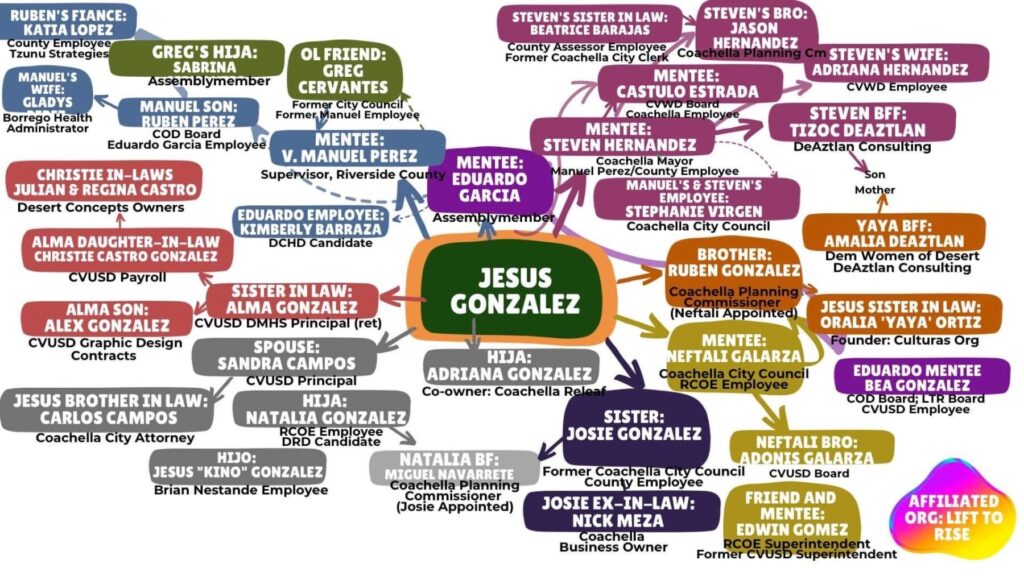Jesus Gonzalez was elected to the Coachella Valley Unified School District in 2016
COACHELLA – This hardscrabble community is home to 42,554 people and covers a total area of 28.95 square miles. There is one man in this growing population — Jesus Gonzalez — and one piece of land — 1254 Seventh St. — that have become the subjects of scrutiny and intense controversy.

Jesus Gonzalez
Gonzalez, who is vice president of the Coachella Valley Unified School District Board of Education, represents Trustee Area 2.
He is well-aware of the growing inquiries and bristles at the mere question of potential impropriety. He spontaneously burst into fit of bluster and bombast and threatened legal action.
He immediately reached out to Rick Olivarez, the District’s General Legal Counsel. Olivarez is the founding and managing partner of the Los Angeles-based Olivarez Madruga Law Organization LLP.
The questions surrounding Gonzalez’s personal conflicts of interest come at a time when an independent audit of the Coachella Valley Unified School District shows the district mis-stepped in reporting some year-end financial statements. Additionally, its comprehensive school safety plan did not meet state requirements for the fiscal year ending June 30, 2022.
Gonzalez is no stranger to trouble as you can see here from this past newspaper article.
The story continues here. Afterward, he stayed out of the public eye.
Now, potential trouble is again knocking at his door.
In a nutshell, CVUSD passed a $250 million bond in 2005 to improve school facilities in its district. In March 2017, with Gonzalez on the board, the district selected architectural firms to build Palm View Elementary School in Downtown Coachella for an estimated cost of $28.5 million. The project is now reported to be $30 million over budget and Gonzalez is the Chair of the Facilities Committee. A ribbon cutting to open the new elementary school located at 1390 Seventh St. took place in October 2021.

Here is a map showing the distance between Jesus Gonzalez’s property and the start of Palm View Elementary School’s property.
Gonzalez owns property within 500 feet of Palm View Elementary School. He has voted on and deliberated at least 14 contracts related to Palm View Elementary without recusing himself, records show. Several contracts were in excess of $1 million. The contracts included civil design engineering services, to irrigation seeding, play equipment, and off-street improvements. Many contracts are with Desert Concepts Construction allegedly owned by a family member. Sources allege the familial ties exist in this document.
As you can see from the link above, Christabel Castro, niece-in-law to Jesus Gonzalez, is the daughter of Desert Concepts Construction’s Vice President Frank Castro. Castro was an officer of Desert Concept Construction prior to going to work at CVUSD.
His attorney vehemently denies Gonzalez having familial ties.
“We are informed by Board Member Gonzalez that he has no familial or financial ties with Desert Concepts Construction,” Olivarez told Uken Report.

Rick Olivarez
“First, it should be observed that the underlying commitment to undertake improvements to the school in a way that could theoretically impact some financial interest of the Board Member was made well before he joined the Board in November 2018, Olivarez said. Accordingly, there is no conflict-of-interest issue as to the District’s 2005 passage of the school facilities improvement bond or action taken in 2017 for the selection of architectural firms.”
Gonzalez was actually elected to the Board by default in 2016, long after CVUSD passed the bond issue, because he had no opponent, therefore he was on the board in 2017 for the selection of architectural firms. He even voted on them. Two opponents challenged him in 2020, but Gonzalez prevailed, according to the Riverside County of Registrar of Voters.
According to documents Uken Report obtained, Gonzalez has participated in numerous decisions relating to architectural firms. You can see the votes here.
The votes he has cast since first being elected, and the decisions in which he has participated, are now being called into question.
Olivarez indicates Gonzalez has done nothing wrong.

A local group that says they are “Fed Up” created this graphic alleging the various ties to community members and conflicts Jesus Gonzalez has.
“As to whether the Board Member was disqualified from involvement in his Board’s deliberation and approval of the (14) contracts you mention in your email on the presumption that the contracts furthered the improvement of a school within 500 feet of the Board Member’s property, there is no indication approval of the contracts had the potential to alter (either positively or negatively) whatever preexisting financial impact the underlying project already presented when its character and scope and the commitment to undertake the improvements were originally decided — before the board member’s tenure on the board,” Olivarez told Uken Report. “Where there is clear and convincing evidence that a decision will not have a measurable impact on the official’s property, the presumption that there is a reasonably foreseeable and material financial effect on properties within 500 feet of the property that is the subject of the decision is overcome.” (2 C.C.R. § 18702.2 (a)(7).)
Also, assuming approval of the 14 contracts altered the financial effect on the board member’s financial interest in his residential property, it does not appear as though such impact would be unique to the board member or different from the effect imposed on a significant segment of residential property owners within the jurisdiction the board member represents – here Trustee District No. 2.
An official is not disqualified from participating in a governmental decision that has a foreseeable and material financial effect on a specified financial interest if the effect is no different from the effect on a significant segment of public within the official’s jurisdiction, Olivarez said.
For residential property interests, FPPC Regulation defines a “significant segment” as at least 15% of residential real property within the official’s jurisdiction, according to Olivarez.
“There is no indication that any possible financial effect that approval of the 14 contracts may have had to the board member’s financial interest in his residential property would have been different from a significant segment of those also owning property in the Trustee District No. 2,” Olivarez said.
As of March 22, 2019, a new standard governs whether public officials have a conflict of interest in government decisions affecting real property interests.
Under the Political Reform Act, public officials may not make, participate in making, or attempt to use their official positions to influence a governmental decision in which they know or have reason to know that they have a disqualifying interest. A public official has a disqualifying interest if the governmental decision at issue will have a reasonably foreseeable, material effect on the official’s financial interests. The Fair Political Practices Commission (FPPC) has amended the standard for determining whether a decision will have a material effect on a public official’s interest in real property.
The most significant change amends the materiality standard for decisions that affect ownership interests in real property. There is now a presumption that a decision involving property within 500 feet of an official’s property will have a material impact on the official’s interest.
“You are pulling sections of a law which is complex and fact-specific,” Olivarez told Uken Report. “As I indicated in the email to you, the analysis isn’t simply if someone lives or (owns) real estate within 500 feet of a project there is per se a conflict. There are many exceptions as I expressed to you in my email. Also, the vote to approve the project was taken before he was a member of the governing board.”
One man, one parcel of property and so many questions. Riverside County authorities also have questions.
Image Sources
- Gonzalez connections: Coachhellx Coachelle
- Conflict of Interest: Shutterstock





![Enrolling Now, Rewarding Careers Ahead [Sponsored]](https://ukenreport.com/wp-content/uploads/2024/04/COD_heroes_1-1385-2-440x264.jpg)

